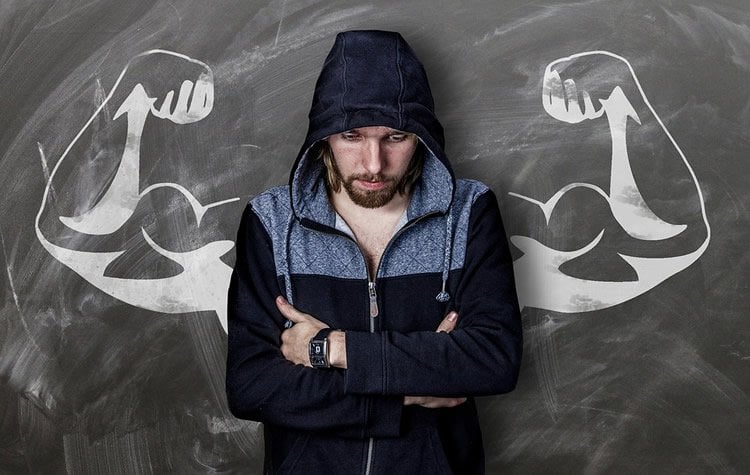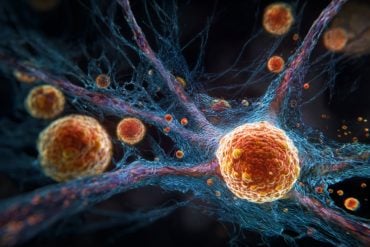Summary: A new study reports physicality and political attitudes may be linked, for men at least. Researchers found more muscular men tend to prefer political attitudes that favor inequality, and the tendency to have positive attitudes toward inequality increased as upper body strength increased following months of physical training. The study, researchers report, challenges conventional belief that people’s political views are shaped by logic and reason alone.
Source: Aarhus University.
Men with large upper-bodies have a tendency to favour inequality in society and a limited redistribution of resources. This is the conclusion drawn by Professor Michael Bang Petersen and Associate Professor Lasse Laustsen from the Department of Political Science in a study published in the journal, Political Psychology.
“The results challenge the belief that our political views are formed by logic and reason alone. Instead, our views seemingly reflect intuitions produced by a Stone Age mind,” says Michael Bang Petersen.
Modern man thinks with his caveman brain
The new study concerns humans, but takes a theoretical starting point in one of the most well-documented findings in the study of animals: Physical strength shapes the conflict behaviour of animals. If animals are larger and stronger than their rivals, they are prone to attempt to assert themselves in the struggle for status and resources. However, if they are weaker than their rivals, they are likely to withdraw from the conflict. According to the latest research results from Aarhus BSS, the same logic applies to modern men when they reason about political conflicts about the redistribution of resources in society.
“This logic was adaptive under the conditions of our hunter-gatherer ancestors, as stronger men here would have been able to secure resources on their own. But it’s an irrational way of dealing with modern day political resource conflicts. Today, physical strength is highly unlikely to affect how big a share of society’s resources you are able to acquire. However, our data shows that physical strength nonetheless continues to affect men’s political attitudes towards redistribution,” says Lasse Laustsen.
According to the researchers, the new results may help explain the paradox of why some men with limited financial resources still favour financial inequality although they would in fact benefit from a greater redistribution of resources.
“Our analysis suggests that these men expects to be able to rise in the hierarchy on their own. And once they reach the top of the hierarchy, an unequal society will increase their chances of maintaining that position,” says Laustsen.
No link between women’s physical strength and attitudes
The study involves both men and women, but when it comes to women there is no link between physical strength and political attitudes. According to the researchers, this complies with the assumption that our approach to modern politics is regulated by ancestral human instincts. Just like other male animals, men have used their physical strength to achieve status, while throughout evolution, women have developed other strategies that take their lower physical strength into account.
“For that reason, the fact that the correlation is not found in women is an important result in itself,” says Petersen.
The researchers believe that their results emphasise the value of involving animal behaviour and the theory of evolution in the study of political behaviour.
“It’s important knowledge if we wish to understand how our political attitudes are formed. They are not just based on reason. Our intuitions are adapted to a different environment than the one we live in today. Our skulls house a Stone Age mind, and we need to appreciate that we are just one animal species among a host of others. Also in our approach to modern politics,” says Laustsen.
Attitudes and physical strength – what affects what?
The researchers cannot say with absolute certainty that the effect is purely one-way – from physical strength to political attitude. The effect can also go the other way.
“We cannot rule out that men with right-wing attitudes are also more prone to go to the gym. That being said, however, there are strong indications that attitudes are actually shaped by physical strength and not the other way round,” says Petersen.
Previous research has shown that men become more aggressive as their physical strength increases. Other studies have shown that there is a correlation between men’s physical strength and their attitudes towards inequality even when exercise habits are taken into account. In addition, the new study includes an experiment conducted among a group of men who trained their upper-bodies for two months. During this period, these men became more positive towards inequality.
Largest study so far and most reliable results
The study builds on data from 6,349 people of different nationalities. 1,875 of the respondents are Danish, and the rest are Belarussians residing in Lithuania, Americans, Venezuelans, Ukrainians and Poles. The data was collected between 2012 and 2017. During this period, when conducting studies on various political attitudes, the researchers also measured and asked respondents about their physical strength.
“Now we have gathered this data in one overall analysis. This also enabled us to revisit studies that I have conducted previously,” says Petersen.
Previous studies have explored the correlation between men’s physical strength and their attitude towards the level of equality in society. However, the results pointed in different directions. In a former study, Michael Bang Petersen found that physical strength only increased support towards inequality among wealthy men, while it decreased support for inequality among men of limited financial means.

“This study builds on a much larger data set, and our measurement of physical strength is more objective than in the previous study. In an international context, this is the most comprehensive study of its kind, and it shows a consistent positive correlation between men’s physical strength and their attitude towards inequality,” says Petersen, who apart from his position at Aarhus BSS is also affiliated with the interdisciplinary Aarhus Institute of Advanced Studies.
The data comes from 12 studies that have applied a variety of methods. Some studies relied on questionnaires and participants were asked to evaluate their own strength compared to others of the same sex. Other studies were conducted in the laboratory and researchers were able to obtain objective measures of, for example, chest strength and handgrip strength.
“The objective laboratory studies actually show a stronger correlation between physical strength and political attitudes than the respondents’ own subjective evaluations. This supports that raw physical strength is indeed the decisive factor,” Laustsen concludes.
Funding: Velux Foundation, Independent Research Fund Denmark, Innovation Fund funded this study.
Source: Mia Ulvgraven – Aarhus University
Publisher: Organized by NeuroscienceNews.com.
Image Source: NeuroscienceNews.com image is in the public domain.
Original Research: Abstract for “Upper‐Body Strength and Political Egalitarianism: Twelve Conceptual Replications” by Michael Bang Petersen and Lasse Laustsen in Political Psychology. Published September 16 2018.
doi:10.1111/pops.12505
[cbtabs][cbtab title=”MLA”]Aarhus University”Muscular Men Prefer an Unequal Society.” NeuroscienceNews. NeuroscienceNews, 10 October 2018.
<https://neurosciencenews.com/muscular-men-inequality-9996/>.[/cbtab][cbtab title=”APA”]Aarhus University(2018, October 10). Muscular Men Prefer an Unequal Society. NeuroscienceNews. Retrieved October 10, 2018 from https://neurosciencenews.com/muscular-men-inequality-9996/[/cbtab][cbtab title=”Chicago”]Aarhus University”Muscular Men Prefer an Unequal Society.” https://neurosciencenews.com/muscular-men-inequality-9996/ (accessed October 10, 2018).[/cbtab][/cbtabs]
Abstract
Upper‐Body Strength and Political Egalitarianism: Twelve Conceptual Replications
Animal models of conflict behavior predict that an organism’s behavior in a conflict situation is influenced by physical characteristics related to abilities to impose costs on adversaries. Stronger and larger organisms should be more motivated to seek larger shares of resources and higher places in hierarchies. Previous studies of human males have suggested that measures of upper‐body strength are associated with measures of support for inequality including Social Dominance Orientation (SDO), a measure of individual differences in support for group‐based hierarchies. However, other studies have failed to replicate this association. In this article, we reexamine the link between upper‐body strength and support for inequality using 12 different samples from multiple countries in which relevant measures were available. These samples include student and locally representative samples with direct measures of physical strength and nationally representative samples with self‐reported measures related to muscularity. While the predicted correlation does not replicate for every single available measure of support for inequality, the overall data pattern strongly suggests that for males, but not females, upper‐body strength correlates positively with support for inequality.







